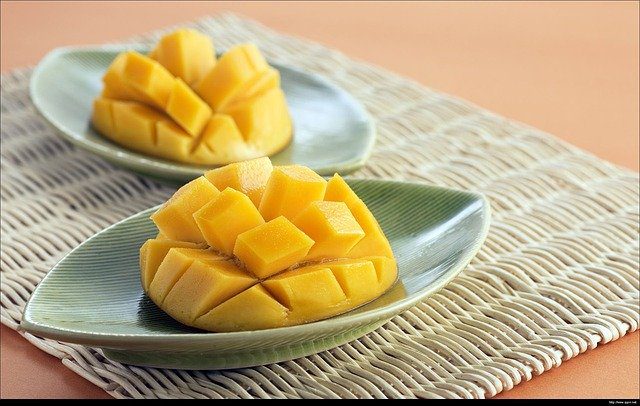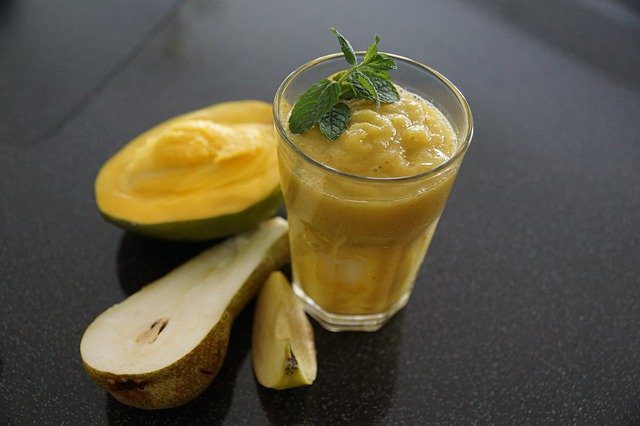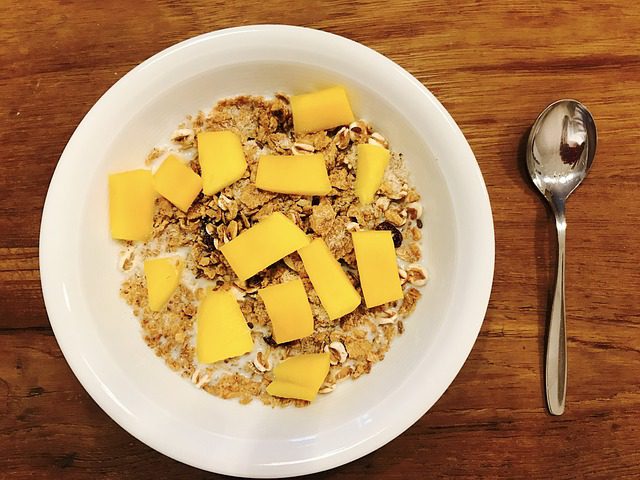This is the season when households across India stock up the mango (aam) as if it’s going out of fashion. And why not, it’s one of the most versatile fruits, and India is home to many types of mango varieties. Mangoes are packed with numerous health benefits and of course, a flavor that’s hard to forget. Apart from being eaten as it is, the King of Fruits is used to make a wide variety of delectable treats – from the simple mango pickle to a healthy smoothie. Some households across the country are even known to store freshly-squeezed mango pulp in their freezers for months, to be brought out and relished when the fruit is not in season.
However, have you ever wondered about the benefits of mango while enjoying this fruit? Are you aware of the possible side effects of mango?
Apart from its undeniable taste, the mango is known for its several health benefits as well. Here, we discuss how they’re used, mango fruit benefits and mango side effects, and even share a few recipes.
Table of Contents
Nutritional Value of Mango
Here’s all the nutritional information you must know before having a mango :
Sr No. |
Parameter |
Value |
| 1 | Calories | 165 grams |
| 2 | Protein | 99 grams |
| 3 | Fat | 0.6 grams |
| 4 | Carbohydrates | 24.7 grams |
| 5 | Dietary Fiber | 2.6 grams |
| 6 | Vitamin C | 67% Reference Daily Intake (RDI) |
| 7 | Copper | 20% RDI |
| 8 | Folate | 18% RDI |
| 9 | Vitamin B6 | 11.6 % RDI |
| 10 | Vitamin A | 10% RDI |
| 11 | Niacin | 7% RDI |
| 12 | Potassium | 6% RDI |
| 13 | Riboflavin | 5% RDI |
| 14 | Manganese | 4.5% RDI |
| 15 | Thiamine | 4% RDI |
| 16 | Magnesium | 4% RDI |
| 17 | Vitamin E | 9.7% RDI |
| 18 | Vitamin B5 | 6.5% RDI |
| 19 | Vitamin K | 6% RDI |
The Health Benefits Of A Mango
There are numerous health benefits of mango. These are detailed in our list below :
1. Prevention From Sunstroke
Mangoes are available only in summer, which makes it clear that it’s a fruit that can help one to bear the heat of the season. The mango prevents us from getting sunstroke and also helps to hydrate the body. A glass of mango shake or mango juice can take care of that. Even raw mangoes are known to help in the prevention of sunstroke.

2. Full Of Antioxidants
Mangoes are loaded with polyphenols, the plant compound that works as antioxidants in our body, thus protecting us from free radicals, the reactive compound that destroys the healthy cells of the body.
3. Strengthen The Immune System
Mangoes are rich in Vitamin C, which assists in iron absorption in the body, boosts immunity, and helps to repair our system. A cup of mango contains about 10% of the body’s daily Vitamin A requirement, thus aiding in boosting immunity. Mangoes are also fairly low in calories.
Also Read: Benefits And Side-Effects Of A Vitamin C Rich Diet
4. Makes The Digestive System Strong
Mango helps in keeping our digestive system strong, thanks to the presence of Amylases, an enzyme that aids in the digestion of food. It breaks even the toughest kind of carbohydrates. Amylases are mostly found in ripe mangoes which is also why ripe mangoes are as sweet as they are.

5. Helps In Maintaining Cholesterol
Nutraceutical, present in mangoes, helps in maintaining the cholesterol levels of the body. A study on mice shows that mangiferin, which is found in the mango, reduced the cholesterol levels in them.
6. Improves Eyesight
Generally, we are recommended to add green leafy vegetables, fresh fruits, and juices but have you ever been asked to include mango in your diet in order to improve your eye health? The antioxidants – lutein and zeaxanthin – present in mangoes act as a natural sunblock as they collect near the retina, thus keeping your eyes from damage.
7. Beneficial For Healthy Heart
Mango is rich in magnesium and potassium, which help in regulating blood pressure thus in turn goes a long way in keeping the heart-healthy.

8. Super Food During Pregnancy
A balanced and nutritious diet is vital during pregnancy for both the mother and baby. Mango is a powerhouse of several nutrients and minerals that make it a perfect pick during pregnancy. However, a word of caution: the mango is also inherently heating and therefore should be consumed in very moderate quantities, especially when one is carrying a baby. A pregnant lady should always seek medical advice before consuming mango.
Also Read: The Tastiest Mango Pickles By Mishry Reviews
9. Aids In Weight Loss
You may be surprised to learn that a mango can actually assist in your weight loss plans. The fruit has plenty of dietary fiber that gives one a feeling of fullness which is beneficial in weight loss. But of course, depending solely on the mango for this is not advisable. A balanced diet and regular exercise are vital.

10. Makes Our Bones Strong
We are always asked to drink milk for stronger bones, but mangoes too contain calcium and can help in the strengthening of bones.
Mango is not only good for our bodies but also for our skin and hair. The Vitamin A and C and beta carotene, present in a mango hydrate our skin and make it healthy. Vitamin A also encourages the growth of sebum, which keeps our scalp well moisturized. And Vitamin C is absolutely necessary in the production of collagen which repairs our skin cells.

Things To Make With The Mango
Add it to dessert or whizz is with milk – the mango is an extremely versatile fruit when it comes to being used in other dishes. Here are some recipes you can try out at home.
1. Mango Ice-cream
You can make mango ice cream at home with readily available ingredients and a few simple steps.
First of all, peel the skin of the mango and grind it within the grinder. Add some sugar or honey in it. On the other hand, boil some full cream milk and let it cool down completely. Add in the mango puree and freeze it. Don’t forget to cover the container with cling film to avoid the formation of ice. Let it stay in the freezer for several hours before taking it out.
2. Mango Shake
During its season, one simply cannot have enough of the mango milkshake. And making it at home as easy as it can get.
Peel the mango, remove the seed, and blend it with a little bit of milk in the mixer. You can add sugar or honey as per your taste. But do check the sweetness of the mango itself before adding anything extra. Serve it chilled. You can add a sprig of mint or even some chopped mangoes as garnish.

3. Mango Falooda
It’s easy to make mango Falooda with few ingredients like fresh mango and ice cream.
Boil milk in a pan and add sugar to it. Bring it down to room temperature and then keep it in the refrigerator. Read the instructions carefully on the packet of Falooda sev and cook it. Mix the Falooda with mango puree and garnish it with mint leaves and enjoy.
4. Mango Halwa
Give a break to the regular aata or suji halwa this summer and try making mango halwa instead.
The method of preparing mango halwa is almost the same as suji halwa. You just need to add mango pieces to it. First of all, roast sooji in ghee and add milk, water, and dry fruits. After getting the thick consistency, add the mango pieces to it. You can also put cardamom or kesar in it.
5. Mango Muffin
You can make a delicious mango muffin, and eggless even, at home.
Peel the mangoes and grind them in a blender. Take wheat flour, sugar, baking powder, and salt in a bowl. Take another bowl and put eggs, cream, and butter. Mix them well and add mango pieces. Lastly, pour it in the muffin cups and bake it in the oven for at least 25 minutes.

5. Mango Muffin
You can make a delicious mango muffin, and eggless even, at home.
Peel the mangoes and grind them in a blender. Take wheat flour, sugar, baking powder, and salt in a bowl. Take another bowl and put eggs, cream, and butter. Mix them well and add mango pieces. Lastly, pour it in the muffin cups and bake it in the oven for at least 25 minutes.
6. Mango Raita
Apart from potato, cucumber, Boondi, and papdi raita, you must try the mango raita also.
Take curd and whip it well. Add spices of your choice such as salt and black pepper. Add the pieces of mango to it and your mango raita is ready.
7. Mango Buttermilk (Lassi)
Mango buttermilk is extremely easy to make and it’s a must-try in summer.
Peel the mangoes and make a puree out of the pulp. Add sugar and cardamom according to your taste. Now add the curd or cream. You can make it as thick as you like it to be. You can either chill it for a while and then serve or just use chilled ingredients.
8. Mango Smoothie
Take one cup curd and add sugar, honey, or jaggery as per your choice. You can also add cinnamon powder (dalcheeni) powder or vanilla essence to it. Add the mango pieces and make it as thick as you’d like it to be. Serve chilled.

9. Mango Chutney
Grind tamarind, red chilies, garlic, and coconut. Add the pieces of mango with salt to taste and mix it well. Your mango chutney is ready.
10. Mango And Oats
Soak oats overnight in the water. Grind them with mango pieces the next morning. You can add milk or water in it for desired consistency. Pour the mixture into a glass and garnish with chopped pieces of your favorite dry fruits. You can also add mango pieces in oats or muesli.

Mango Side Effects – Why We Need To Eat Mangoes In Moderation?
We have discussed the benefits of eating a mango. However, moderation is the key to good health. Now that you know about the benefits of mango, let us see at the possible side effects of mango. Excessive intake can lead to various side effects. So let’s take a look at the mango side effects :
1. Can Increase The Sugar Level
Patients with diabetes should be very cautious about the quantity of mangoes they eat. Even though it’s completely natural, mangoes have very high sugar content. You should always consult your doctor before eating a mango, especially if you have diabetes.
2. Weight Gain
Even though mangoes can help with your weight loss plan, since it fills your stomach really well, it can have exactly the opposite effect if eaten in larger quantities. A mango has 135 calories so it needs to be consumed wisely.
3. Indigestion
Eating excessive amounts of unripe mangoes can cause stomach related issues such as indigestion and gas.
4. Throat problems
Now, who’d have thought that eating an extra mango or two can give you a sore throat or throat irritation? So keep an eye on how much you’re eating every day. Also, try to avoid drinking cold water after eating a mango.
5 Allergy
Even though allergies due to mangoes are quite rare but if you are allergic to some fruits then you must consult your doctor regarding it.
Frequently Asked Questions
Here are some interesting FAQs on the benefits of mango and the possible side effects :
1. What are the disadvantages of eating a mango?
A high intake of mangoes can cause many problems such as weight gain and a rise in blood sugar levels due to the natural sugars in it. It can also lead to indigestion as well as throat problems.
2. Is mango good for the skin?
Being rich in vitamins A, C, and E as well as beta carotene, mango is crucial for the wellness of the skin. The right amount of mangoes can be very beneficial for skin health.
3. Can we eat mango at night?
Mango is known for balancing cholesterol levels; it has vitamin C and pectin that may help to fix insomnia.
The Bottom Line
Mangoes being tastiest is one of the healthiest fruits. There are numerous benefits of mango from weight loss to improve stomach-related issues to boosting immunity. So, these summers try the best to include this fruit in your daily diet by adding to various different recipes and dishes. But care should also be taken to avoid over consumption, as there are various mango side effects too.


